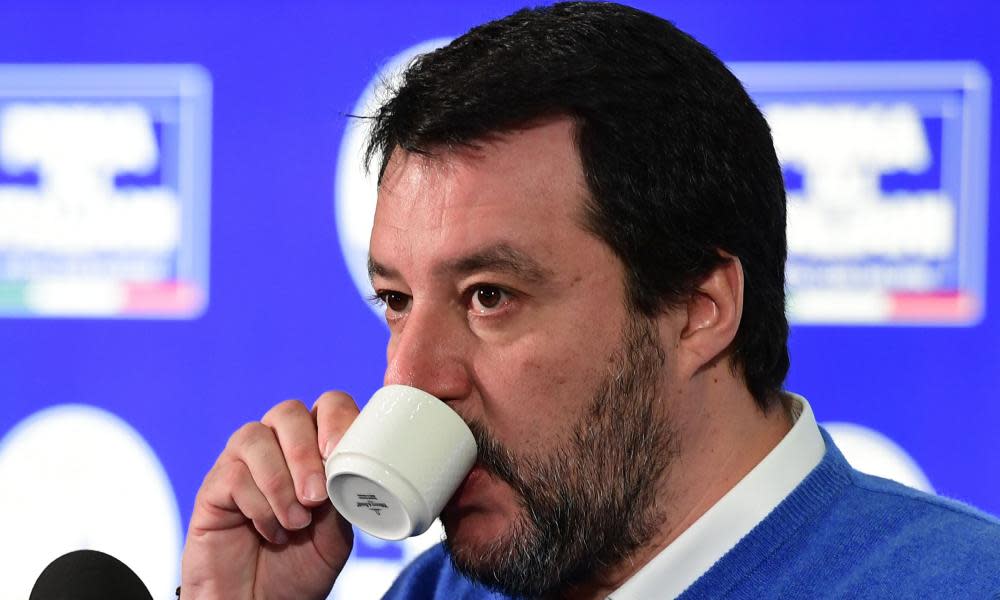The Guardian view on Italy’s red wall region: saved by the ‘sardines’

There were rumours of imminent collapse, but Italy’s red wall held up, albeit battered and with some sections missing. After success in a series of regional elections, including in leftwing Umbria, Matteo Salvini’s League party failed last weekend to win the biggest prize of all: the northern region of Emilia-Romagna, which has voted for the left since the second world war.
Mr Salvini had made sure this battle took on a national significance. With characteristic self-confidence, he expended large amounts of political capital pursuing a stunning victory over the Democratic party (PD) in its historic back yard. The hope was to trigger a general election. Instead, the League’s leader found himself targeted and outshone by a pop-up anti-populist movement, the “sardines”, whose supporters’ rallies consistently eclipsed his own in numbers and pizzazz. The headlines helped generate a huge turnout at the polls and, in the end, the League did better than before in the region, but not well enough. After spending weeks encamped in and around Bologna, Mr Salvini must now beat a chastened retreat.
The result provides a much-needed morale boost for the centre-left, as it seeks to prolong the life of Italy’s fragile coalition government. But the relief may be temporary. The most significant aspect of Sunday could prove to be the catastrophic performance of the PD’s imploding coalition partner, the Five Star Movement. Founded by the comedian Beppe Grillo in 2009, Five Star swept into power two years ago as the country’s biggest parliamentary party, with 32% of the national vote. Having won popularity as an anti-politics movement, the party has spectacularly failed to thrive while in government. In Emilia-Romagna it slipped below 5%, and also performed terribly in its former stronghold of Calabria. Last week, the gaffe-prone Italian foreign minister, Luigi Di Maio, resigned as leader amid ongoing infighting and factionalism. The humiliation at the polls prompted one commentator to suggest that the party’s 210 MPs and 99 senators have now assumed zombie status. A fractious party congress planned for March could make it or break it.
Mr Salvini thus retains substantial reasons to be cheerful. With the largest coalition party in disarray, the ability of the government to perform effectively is clearly a matter of some doubt. The League enjoys a 10-point lead nationally over the PD, and its far-right allies, Brothers of Italy, are regularly scoring over 10% in polls. So, having duly celebrated holding on to a region that should never have been vulnerable in the first place, the PD must reflect hard on how disaster was averted. In particular, it should try to learn from the impact of the sardines movement.
Conceived as a civic, non-aligned protest against Mr Salvini’s bullying language and aggressive populism, the sardines lent a charisma and creativity to the fightback against the League that has been sorely absent on the conventional centre-left. Piazzas packed (sardine like) with singing crowds, complete with cutouts of fish, dominated coverage and carried a subversive, slightly surreal appeal. In the early hours of Monday morning, the PD’s leader, Nicola Zingaretti, expressed his gratitude for the “shake-up” the movement provided. There are broader lessons here in how to take on the crude caricatures, stereotypes and verbal attacks that characterise rightwing populism in Italy and elsewhere. In March, the movement’s founders plan a national conference in Naples to discuss its future. The PD and Italy’s centre-left would do well to hug this movement close. Swimming with the sardines helped keep the party afloat in Emilia-Romagna.

 Yahoo News
Yahoo News 
